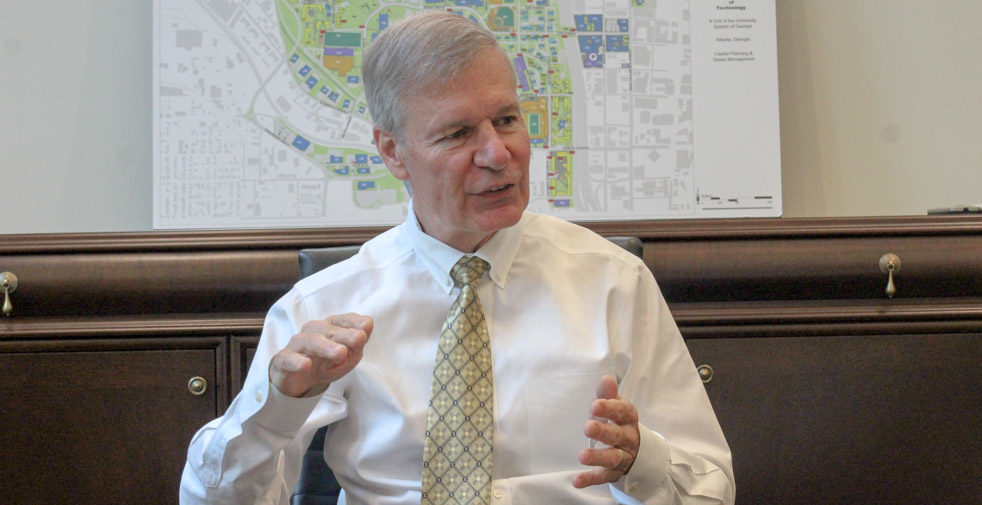Ten years in review
In the absence of his annual institute address, President G.P. Bud Peterson bid farewell to the university as its president and thanked the community for his time in the position.
Peterson’s academic career spans three institutions: Texas A&M, Rensselaer Polytechnic Institute, and the University of Colorado at Boulder. With a doctorate in mechanical engineering, he has been widely published in the field of phase change heat transfer.
His selection as Tech’s next president came after the 12 year tenure of President Wayne Clough, who was credited with bringing the institute national and international recognition.
In the years since Peterson took office, he hoped to continue the institute on a “trajectory of excellence.”
“I am honored by the opportunity to serve as President of the Georgia Institute of Technology,” said Peterson. “As an engineer, this is, of course, a great professional fulfillment. But as someone who has spent a majority of his career as an educator, it also presents an opportunity to continue to have an impact on higher education nationally. Georgia Tech is at the forefront of innovation and discovery in a time in our nation’s history where both are great necessities, and I am privileged to be a part of these efforts.” Peterson said in a brief address shortly after the announcement of his appointment.
Under Peterson’s leadership, campus research has thrived. Total research awards now exceed $1 billion, and Tech has numerous partnerships with government, industry and educational institutions. And in the past decade, total research expenditures and sponsored activities increased by 78% to $908 million.
Enrollment and diversity have also increased under Peterson. Specifically, admission applications more than tripled, graduate enrollment increased by 159%, and the number of women in the first-year class increased from 32 to 40%. Freshman-to-sophomore retention rate has continued to increase.
“When we talk about creating the next,” Peterson said, “it’s about what Georgia Tech has been able to do, not what I’ve been able to do. This has been a great platform to take some ideas and make them come from fruition.”
He went on to describe novelty of new programs like the Online M.S. in Computer Science and the Create-X Program, and emphasized how unique it makes the institute.
“10% of the masters in computer science in the country will come from Georgia Tech,” he explained.
In the last couple of years, the Tech administration has been under scrutiny due to a variety of crises, beginning with the death of Scout Schultz at the hands of a Georgia Tech Police Department (GTPD) officer on Sept. 2017, continuing ethic scandals revealed in summer 2018. Peterson believes he has made an ample short-term response to these issues and has set the foundation for long-term cultural shifts.
“We’ve made the changes, we’ve incorporated them, we’ve put them in place,” Peterson said. “Now we just need to make sure they’re regularized and become part of the DNA of how we operate.”
In January 2019, President Peterson announced his intention to step down from his current position into a faculty role as soon as his successor was in place. According to Peterson, the exit process has been busy. “I haven’t had a chance to feel much,” he commented, “[but] I’ll miss being on the front-end of all of upcoming initiatives. I can’t think of a better job than being at a university.”
When he steps down into his faculty role, Peterson can resume researching and teaching mechanical engineers about heat transfer. His specific topics of choice include optimal systems in nature, applications of heat transfer to electronics, rapid temperature reductions and their clinical applications, and interfacial transport phenomena.
Georgia Tech’s 12th president will be Dr. Angel Cabrera, previously president of Georgia Mason University. Cabrera earned his Ph.D. and M.S. in cognitive psychology at Georgia Tech and his B.S. and M.S. in computer and electrical engineering at Universidad Politécnica of Madrid. He will be the second president who is also a Tech alumnus and will assume Georgia Tech’s presidency on September 1, 2019.
“Never in my wildest dreams,” Cabrera wrote in his first letter to the community, “did it occur to me then that one day I would be asked to return as president. But what I know is that everything I have been able to achieve can be traced back to my experiences at Georgia Tech.”
Peterson is excited about Cabrera, who served on the Tech Advisory Board for nearly a decade.
“Tech is what it is today because of the collective efforts of the faculty, staff, students and leadership,” Peterson said, “and I’d like to see that continue.”
